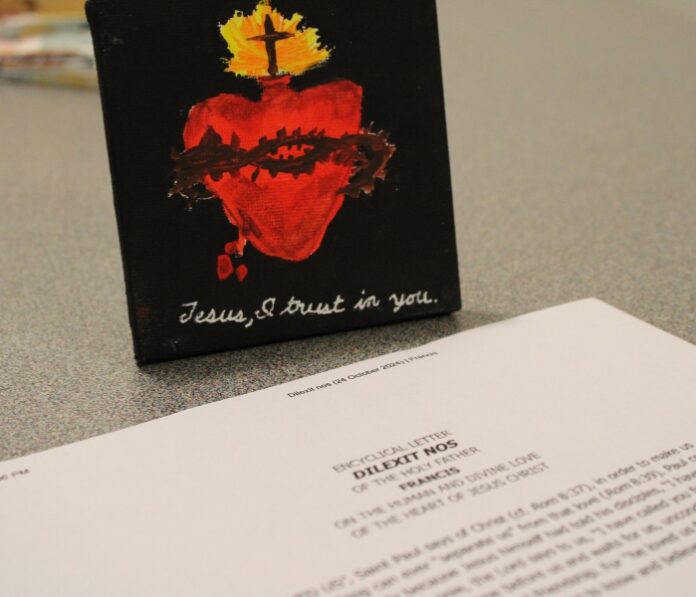
“All of us need to Rediscover the Importance of the Heart.”
Pope Francis put forth the encyclical “Dilexit Nos” on Oct. 24 and dedicated it to the Sacred Heart of Jesus. The encyclical contains reflections on Christ’s love for us in His dual nature as God and man, the historical development of the devotion to the Sacred Heart and the message that the heart needs to be cherished and preserved despite what modern culture preaches.
Pope Francis calls for a “Church-renewed reflection on the love of Christ represented in His Sacred Heart.”
Pope Francis reflects on both our capacity to love and the love that God has for us: “In the deepest fiber of our being, we were made to love and to be loved.” His reflection also dives deeper into the “heart” as the essential element of our humanity.
Pope Francis writes, “If we fail to appreciate the specificity of the heart, we miss the messages that the mind alone cannot communicate; we miss out on the richness of our encounters with others; we miss out on poetry. We also lose track of history and our own past, since our real personal history is built with the heart. At the end of our lives, that alone will matter.”
The heart is the source of unity for both mankind and the individual. This idea is found within our language and expressions. Sayings such as, “to learn something by heart,” “to speak from the heart” and “to pour your heart out” all communicate an intimate action of the person.
Pope Francis sees that the deep core of our humanity is found within the heart but that modern society rejects the heart as the core of the person. Even in philosophy, the heart is often ignored in favor of discussing the ideas of freedom, will, and conscience.
He remarks on the nuance of discussing the matters of the heart, which may be “due to the difficulty of treating it as a ‘clear and distinct idea,’ or because it entails the question of self-understanding, where the deepest part of us is also that which is least known.”
The biblical sources for this expression of Jesus’s love is found in the Gospels when “the evangelists, while at times showing him in his power and glory, also portray his profound emotions in the face of death and the grief felt by his friends.”
Scripture shows Jesus with human emotions. He weeps on several occasions in the Gospels: for Jerusalem, for his friend Lazarus and during his agony in the garden.
In the Gospels, Mary also has deep feelings and reflections in her heart. With the arrival of the shepherds and their news at the stable in Bethlehem, it is written that “Mary kept all these things, reflecting on them in her heart.”
Before you jump to the conclusion that this type of love is a corny sentimentalism, recall that the greatest expression of love is found in Christ crucified. Christ became man and took a humble place in society in order to show the dignity and worth of every human person. The love that God has for us is shown through His actions.
Pope Francis writes, “The Church has chosen the image of the heart to represent the human and divine love of Jesus Christ and the inmost core of his Person.” He mentions many saints who have had private revelations and deep devotion to the Sacred Heart.
Most famous among these saints and devotions are St. Faustina with Divine Mercy, and St. Margaret Mary with the Sacred Heart devotion. These devotions are “rich sources of encouragement and can prove greatly beneficial, even if no one needs feel forced to follow them should they not prove helpful on his or her own spiritual journey.”
“In this age of artificial intelligence, we cannot forget that poetry and love are necessary to save our humanity,” Pope Francis writes. Life is made of beautiful moments, such as picking flowers, singing around bonfires, chasing your friends down the Mall during charity week or jailing your professors.
These are the moments when we are engaged with the world and people around us. These are the moments of the heart. Know that you are loved first by God, and take inspiration from the Sacred Heart of Jesus to go out and love others.
Bio: Sophie del Mazo is a junior history major with an ethics concentration.